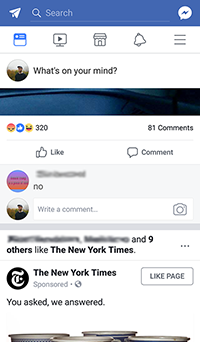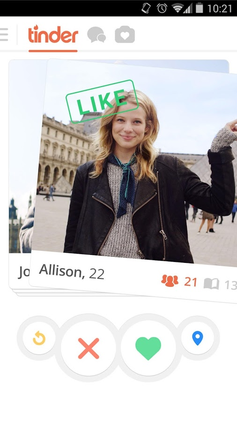Related Research Articles

Online dating, also known as internet dating, virtual dating, or mobile app dating, is a method used by people with a goal of searching for and interacting with potential romantic or sexual partners, via the internet. An online dating service is a company that promotes and provides specific mechanisms for the practice of online dating, generally in the form of dedicated websites or software applications accessible on personal computers or mobile devices connected to the internet. A wide variety of unmoderated matchmaking services, most of which are profile-based with various communication functionalities, is offered by such companies.

OkCupid is a U.S.-based, internationally operating online dating, friendship, and formerly also a social networking website and application. It features multiple-choice questions to match members. Registration is free. OkCupid is owned by Match Group, which also owns Tinder, Hinge, Plenty of Fish, and many other popular dating apps and sites.
Match is an online dating service with headquarters are in Dallas, Texas. The company has offices in Dallas, West Hollywood, San Francisco, Tokyo, Rio de Janeiro, and Beijing. Match is owned by Match Group, which owns several online dating services.

Mobile social networking is social networking where individuals with similar interests converse and connect with one another through their mobile phone and/or tablet. Much like web-based social networking, mobile social networking occurs in virtual communities.

Odnoklassniki, abbreviated as OK or OK.ru, is a social networking service primarily in Russia and former Soviet Republics. The site was launched on March 4, 2006 by Albert Popkov and is currently owned by VK.
Social network advertising, also known as social media targeting, is a group of terms used to describe forms of online advertising and digital marketing that focus on social networking services. A significant aspect of this type of advertising is that advertisers can take advantage of users' demographic information, psychographics, and other data points to target their ads.
This is a partial, non-exhaustive list of notable online dating websites and mobile apps.
Plenty of Fish (POF) is a Canadian online dating service, popular primarily in Canada, the United Kingdom, the Republic of Ireland, Australia, New Zealand, Spain, Brazil, and the United States. It is available in nine languages. The company, which is based in Vancouver, British Columbia generates revenue through advertising and premium memberships. While it is free to use, Plenty of Fish offers premium services as part of their upgraded membership, such as allowing users to see who has "liked" a member through the service's MeetMe feature, and whether a message has been read and/or deleted.

Social media marketing is the use of social media platforms and websites to promote a product or service. Although the terms e-marketing and digital marketing are still dominant in academia, social media marketing is becoming more popular for both practitioners and researchers.

Instagram is a photo and video sharing social networking service owned by Meta Platforms. It allows users to upload media that can be edited with filters, be organized by hashtags, and be associated with a location via geographical tagging. Posts can be shared publicly or with preapproved followers. Users can browse other users' content by tags and locations, view trending content, like photos, and follow other users to add their content to a personal feed. A Meta-operated image-centric social media platform, it is available on iOS, Android, Windows 10, and the web. Users can take photos and edit them using built-in filters and other tools, then share them on other social media platforms like Facebook. It supports 32 languages including English, Hindi, Spanish, French, Korean, and Japanese.

9gag is an online platform and social media website based in Hong Kong, which allows its users to upload and share user-generated content or other content from external social media websites. Since the platform for collections of Internet memes was launched on April 11, 2008, it has grown in popularity across social media such as Facebook, Twitter, and Instagram.

Julie Spira is an author and media personality on the subjects of online dating, social media, mobile dating, and netiquette. She wrote The Perils of Cyber-Dating: Confessions of a Hopeful Romantic Looking for Love Online. Spira has written about the intersection of love and technology for numerous publications.

Vine was an American short-form video hosting service where users could share up to 6-second-long looping video clips. It was originally launched on January 24, 2013, by Vine Labs, Inc and Big Human. Bought by Twitter, Inc. in 2012 before its launch, the service was shut down on January 17, 2017, and the app was discontinued a few months later.

Tinder is an online dating and geosocial networking application launched in 2012. On Tinder, users "swipe right" to like or "swipe left" to dislike other users' profiles, which include their photos, a short bio, and some of their interests. Tinder uses a "double opt-in" system, also called "matching", where two users must like each other before they can exchange messages.
The hashtag #NotAllMen is a feminist Internet meme. A shortening of the phrase "not all men are like that", sometimes abbreviated "NAMALT", it is a satirical parody of arguments used to deflect attention away from men in discussions of sexual assault, the gender pay gap, and other feminist issues.
Bumble is an online dating and networking application launched in 2014. Profiles of potential matches are displayed to users, who can "swipe left" to reject a candidate or "swipe right" to indicate interest. Until 2024 only female users could make the first contact with matched male users, while in homosexual matches either person can send a message first. The app is a product of Bumble Inc.
Match Group, Inc. is an American internet and technology company headquartered in Dallas, Texas. It owns and operates the largest global portfolio of popular online dating services including Tinder, Match.com, Meetic, OkCupid, Hinge, Plenty of Fish, OurTime, and other dating global brands. The company was owned by IAC until July 2020 when Match Group was spun off as a separate, public company. As of 2019, the company had 9.3 million subscribers, of which 4.6 million were in North America. Japan is the company's second largest market, after the United States.
An online dating application, commonly known as a dating app, is an online dating service presented through a mobile phone application. These apps often take advantage of a smartphone's GPS location capabilities, always on-hand presence, and access to mobile wallets. These apps aim to speed up the online dating process of sifting through potential dating partners, chatting, flirting, and potentially meeting or becoming romantically involved.

Mary-Belle Kirschner, better known as Belle Delphine, is a South African-born British media personality, pornographic actress, model, and YouTuber. Her social media accounts feature erotic and cosplay modelling, sometimes blending the two together. Her online persona began in 2018 through her cosplay modeling on Instagram. Her posts on the platform were often influenced by popular memes and trends.

Swiped: Hooking Up in the Digital Age is an American documentary film that premiered on September 10, 2018 on HBO. Directed by journalist Nancy Jo Sales, the film explores dating, relationships, and hookup culture amongst young people in the era of online dating apps.
References
- 1 2 3 4 5 6 7 8 Birch, Jenna (28 September 2018). "Her Instagram account Bye Felipe exposes online-dating creeps. Now she's turned it into a book". The Washington Post . Retrieved 14 June 2020.
- 1 2 "Bye Felipe". Know Your Meme. Retrieved 2020-06-14.
- 1 2 3 Khazan, Olga (2014-10-27). "Why Men Send Obscene OkCupid Messages". The Atlantic. Retrieved 2020-06-14.
- ↑ Romano, Andrea. "'Bye Felipe' documents the biggest jerks in online dating". Mashable. Retrieved 2020-06-14.
- 1 2 3 4 5 Martin, Brittany (2018-08-21). "The Woman Behind "Bye Felipe" Has Written the Ultimate Guide to Modern Dating". Los Angeles Magazine. Retrieved 2020-06-14.
- ↑ "Bye Felipe: A Place to Publicly Shame Rude Men". The Cut. Retrieved 2020-06-14.
- ↑ Bahadur, Nina (2014-10-29). "Instagram Account Beautifully Calls Out Online Dating's Worst Guys". HuffPost. Retrieved 2020-06-14.
- 1 2 Shaw, Frances (2016-10-17). ""Bitch I Said Hi": The Bye Felipe Campaign and Discursive Activism in Mobile Dating Apps". Social Media + Society. 2 (4): 205630511667288. doi: 10.1177/2056305116672889 . ISSN 2056-3051.
- ↑ Tweten, Alexandra (31 October 2014). "Why I Created Bye Felipe". msmagazine.com. Retrieved 2020-06-14.
- ↑ Tweten, Alexandra (2018-08-21). Bye Felipe: Disses, Dick Pics, and Other Delights of Modern Dating. Running Press. ISBN 978-0-7624-6373-2.
- ↑ Zimmerman, Jess (2014-10-28). "Not all men are awful to women on the internet. Those who aren't need to act | Jess Zimmerman". The Guardian. ISSN 0261-3077 . Retrieved 2020-06-14.
- ↑ Smith, Kyle (2014-10-30). "Tinder jerks get shamed by hilarious Instagram account". New York Post. Retrieved 2020-06-14.
- ↑ Moore, Lane (2014-10-30). "'Bye Felipe' Is the Best New Instagram Account for Your Gross Online Dating Messages". ELLE. Retrieved 2020-06-14.
- ↑ Moore, Lane (2014-10-30). ""Bye Felipe" Is the Best New Instagram Account for Your Gross Online Dating Messages". Cosmopolitan. Retrieved 2020-06-14.